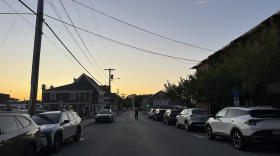Eighty-six percent of the land on Cape Cod is either developed or preserved. The Cape We Shape is a new effort to conserve much of the rest.
-
We discuss why rates are increasing, tips for homeowners as they navigate home insurance policies, and how communities can reduce some of the risks that drive up insurance costs.
-
-
GOOD GUESS. On the street in Woods Hole. Produced by Mae Nagusky and Atlantic Public Media.
-
C.L. makes her way out of the snow to help your garden and to give tips on growing tomatoes.
-
A round up of local news headlines with our regions leading journalists.
The Point
-
Neuroscientist Lisa Feldman Barrett joins us to discuss surprising insights into how our brains operate and how it impacts our actions and emotions.
-
-
How Autonomous Underwater Systems are helping humans explore the ocean, and more.
-
A round up of local news headlines with our regions leading journalists.
NPR Stories
-
It's designed to take the place of complicated, multiple drug regimens that many people with HIV need to follow. And it's also beneficial because the HIV virus is always evolving.
-
Organizers say SoulSlide offers a chance to learn winter sports at a more affordable price in a relaxed environment.
-
Director Chloé Zhao used meditation, somatic exercises and dance to inspire the cast and crew of this Oscar-nominated story about William Shakespeare's family.
-
March is always a big one for books – this year is no different. We call out a handful of upcoming titles for readers to put on their radars — offering a good alternative to doomscrolling.
-
President Trump spoke live for the first time Monday since the U.S. and Israel began striking Iran, sharing his administration's objectives for the country.
Support for CAI is provided by
Support for CAI is provided by
CAI Pub Night are back for 2026
Join us for our next free pub night at Siena Restaurant
Tuesday March 3rd from 5 to 7 p.m.
Join us for our next free pub night at Siena Restaurant
Tuesday March 3rd from 5 to 7 p.m.
























